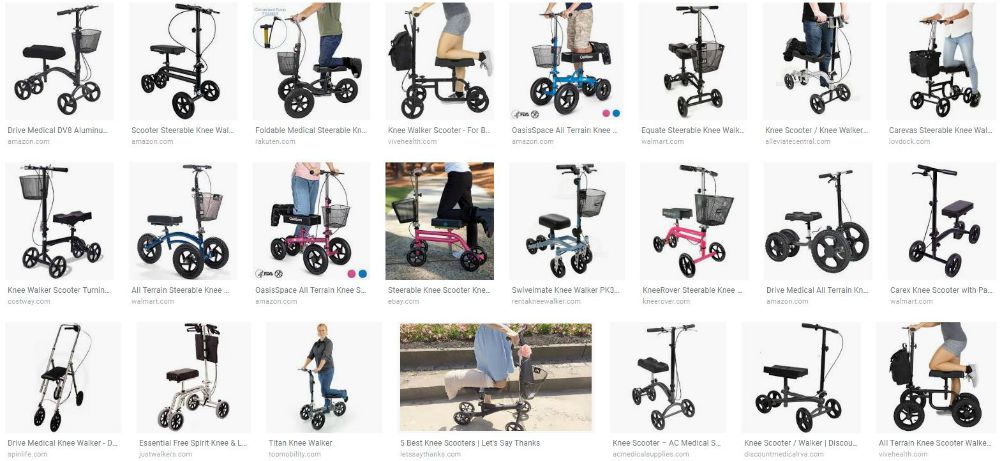
Screenshot of selection of knee scooters available online
These days, I'm sporting a purple cast on my leg. When people ask me the reason for my fiberglass-wrapped leg, I tell them the truth: "My parts are out of warranty." People my age always laugh. They get it. The factory-installed parts have failed. Now we're forced to go searching for replacements. Sometimes we find that they just don't carry that model anymore.
Remember when Titus Andromedon went on a futile search for a cassette tower in Season 2 of the Netflix hit "Unbreakable Kimmy Schmidt"? (Six weeks' non-weight-bearing gives me plenty of time to binge-watch.) Well, that's what it's like, only this time for folks who can remember where they were when President John F. Kennedy was assassinated. We're the cassette tower. And the tapes.
I spent the weeks before the surgery getting ready. That meant filling my bathroom and bedroom with mobility devices: crutches, a walker, a knee scooter, a versa frame attached to my toilet and a tub-shower transfer chair installed in my tub. A friend who is an occupational therapist came over and worked with me to learn how to use them all properly.
I was on my own trying to get Medicare to pay for a portion of it. Here's what I learned. A knee scooter — my fastest, easiest and most comfortable mode of transportation — is classified as a "luxury device" by Medicare. So what will Medicare pay for? Crutches, or a device called a "walking crutch." Look that one up. You'll find a picture of what appears to be a 20-something smiling as she walks hands-free — really, I didn't make this up — down a long flight of concrete stairs. My daughter glanced at the picture, shook her head and said, "No, Mom. Just, no."
I practiced using crutches. I can do it, but I'm not going far on them and I'm not going often. It's too hard on my arms and wrists. With crutches alone, I'll spend more time in my chair or bed, and that's not good for my recovery. I need to be up, and moving. The walker is best for short distances between bed and bath, and the knee scooter is best for longer distances around and out of the house.
I ask my daughter, who cares for many poor people in a clinic on our eastern plains, about it. What happens to her older patients who can't afford to pay out of pocket for a knee scooter? She says, "They stay home. And they fall on their crutches and then have other problems."
Advertisement
If a knee scooter is a "luxury item," forget about other non-transportation mobility devices. These allow me to bathe by myself and use the toilet by myself. This builds strength and agility, while maintaining the autonomy and dignity that is itself a valuable kind of therapy.
And then there are the drugs. My surgeon prescribed one that is meant to help with an unpleasant side effect of opioid pain medications. There is yet no generic option. We paid close to $400 out of pocket for a 30-day supply. I asked my daughter about that one. She says, "Most of my patients would just refuse the prescription. They'll go without."
If you want everything you will need, prepare to pay out of pocket. But what if the pocket is empty?
I'm going to have a lot of prescription medicine I no longer need when I am healed. My daughter tells me about the volunteer-run The Lord Cares Pharmacy, where people in our community can receive medications free. Its motto is "Have mercy on me, Lord, for I am faint; heal me, Lord, for my bones are in agony," from Psalm 6. She thinks I can donate my pain meds, which will then be dispensed to others who need them. The pharmacy is a mission of Open Bible Baptist Church.
I have an idea. What if Catholic parishes in every diocese started a mission of their own with mobility device lending closets? Couldn't we find a spot in our ecclesial basements?
Those of us fortunate enough not to need our devices long-term have gently used items that can help many others. I will rejoice when my bathroom loses its hospital-room appearance. I will be happy to pass the versa frame and tub chair to someone else who needs them. I will rejoice when my bedroom speaks rest more than recuperation.
My seldom-used crutches leaning against the wall? Someone needs them. My walker? Someone else needs that. And my knee scooter with the faux-sheepskin pad and the nifty basket? A knee scooter means getting around the house and out of the house.
I had some days in February when I knew what the psalmist meant when he cried, "My bones are in agony." But I am among the most fortunate. I have everything I need, and more than I can begin to appreciate. I have family to help and friends to comfort and many hands to cook and clean and carry me to the places I most need or want to go.
But there are others who face illness or surgery alone, who are unprepared in many ways. If you have a mobility closet in your parish, I'd like to hear about it. Those of us who have been helped can, and must, help others.
[Melissa Musick Nussbaum's latest book, with co-author Anna Keating, is The Catholic Catalogue: A Field Guide to the Daily Acts That Make Up a Catholic Life.]





